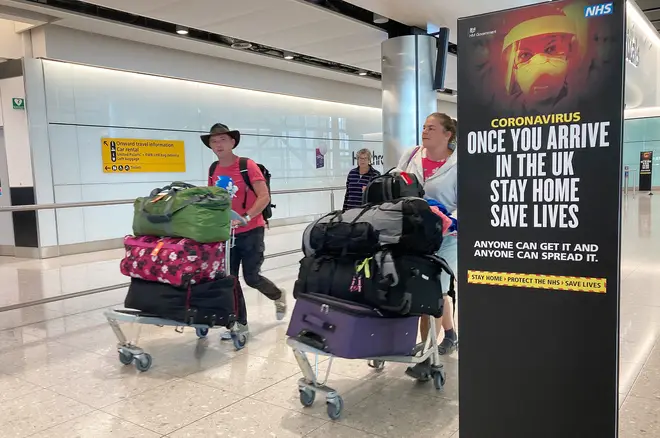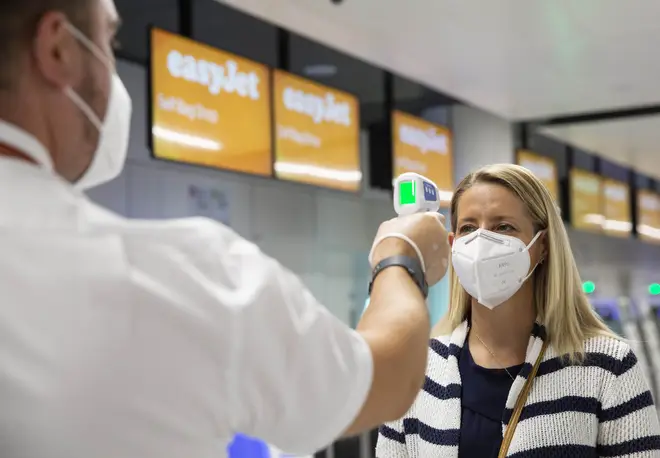
Oli Dugmore 4am - 7am
2 June 2020, 23:26

Foreign travellers entering the UK could face deportation if they disobey coronavirus quarantine rules, according to government restrictions.
The new measures, laid out by ministers, are due to be set out by Home Secretary Priti Patel on Wednesday.
However, the restrictions have divided Conservative MPs and have led to criticism from businesses.
Read more: Could 'air bridges' save summer holidays for Brits?
Read more: UK beaches packed for another day despite social distancing measures
Under the measures, which are set to be enforced from 8 June onwards, people arriving in the UK will be required to isolate for 14 days in order to stop Covid-19 from being imported into the country.
However, the decision to deport individuals who fail to quarantine will be "a last resort," the Home Office said.
Anyone breaking the rules could face a £1,000 fixed penalty notice in England, with a prosecution and unlimited fines both potential follow-up punishments.

UK could introduce 'air bridges' for countries with low transmission - Transport Secretary
Failure to fill out the form declaring where the individual will live for two weeks will also be punishable by a £100 fixed penalty notice.
Ms Patel explained that the reason for introducing the measures would be to "protect the public's health" and to "avoid a second peak that overwhelms the NHS."
She said: "As we get the virus under control here, we must manage the risk of cases being imported from abroad.
Read more: Matt Hancock defends testing figures after statistics watchdog criticised data
Read more: BAME groups up to twice as likely to die with Covid-19, PHE report finds
"We owe it to the thousands who've lost their lives not to throw away our progress.
"These measures are informed by science, backed by the public and will keep us all safe."
The restrictions will be in place across the UK but will be set individually by the devolved administrations. However, the government will review them by 29 June.

Ministers have said they will study the impact the restraints are having on the economy, as well the role antibody testing could have on lowering the health risk involved, when considering whether to alter the arrangements.
Transport Secretary Grant Shapps said: "These measures will be reviewed every few weeks, and we are working with the transport industry to see how we can introduce agreements with other countries when safe to do so, so we can go abroad and tourists can come here."
No 10 suggested on Tuesday that the restrictions would be similar to those imposed during the coronavirus lockdown.
Downing Street said visitors and those returning from abroad would be allowed to leave isolation to shop for food and other essential supplies.
Travellers will also be able to board public transport from the port or airport to where they will quarantine, although they will be encouraged to use private vehicles.
Boris Johnson's official spokesman confirmed on Tuesday that the government is still looking at the prospect of "air bridges" between the UK and other countries, creating specific exemptions from the quarantine rules.

German Health Minister on likelihood of party holidays this summer
Reports suggest the prime minister is in favour of the plan.
There have been calls from senior Tories for the quarantine plan to be scrapped in favour of the so-called air bridge solution.
Former transport minister Stephen Hammond told BBC Radio 4's Today programme that air bridges would be a "sensible, targeted response" between low-risk countries.
"I think the idea of air bridges are the right way forward," he added.
"I think, as we've seen across the world, people are taking measures out of the lockdown and this targeted approach would be a much more sensible way to behave."
George Morgan-Grenville, chief executive of tour operator Red Savannah, said: "By pursuing its quarantine plans without due regard for the economic consequences, the government is choosing to ignore the devastation it will cause to companies, to employment and to the lives of all those whose jobs will be lost.
"The quarantine measures are a blunt weapon which will bring only economic disaster."
Listen & subscribe: Global Player | Apple Podcasts | Google Podcasts | Spotify